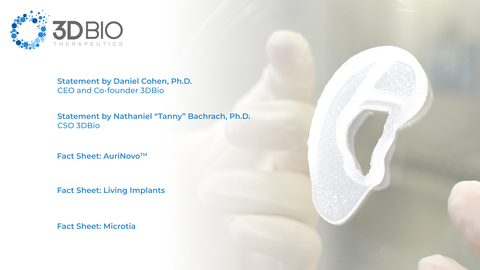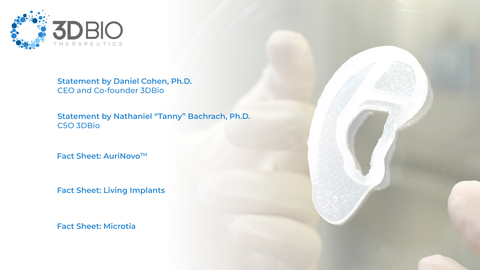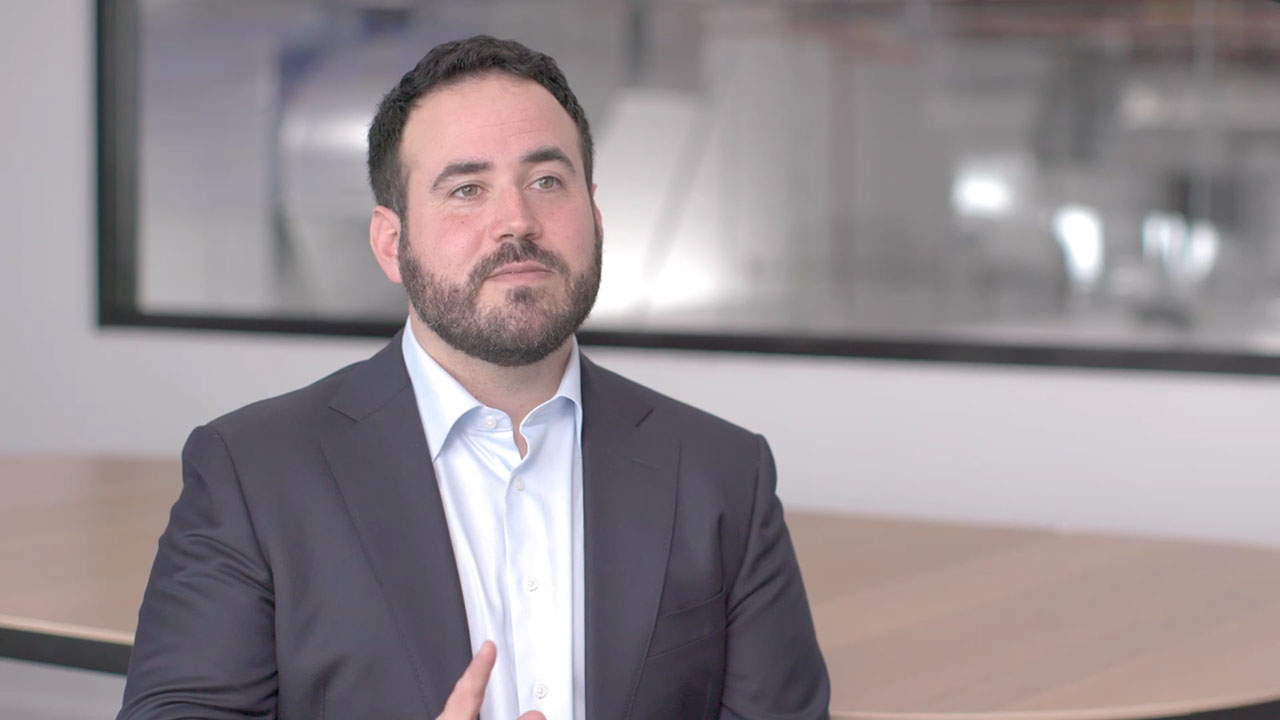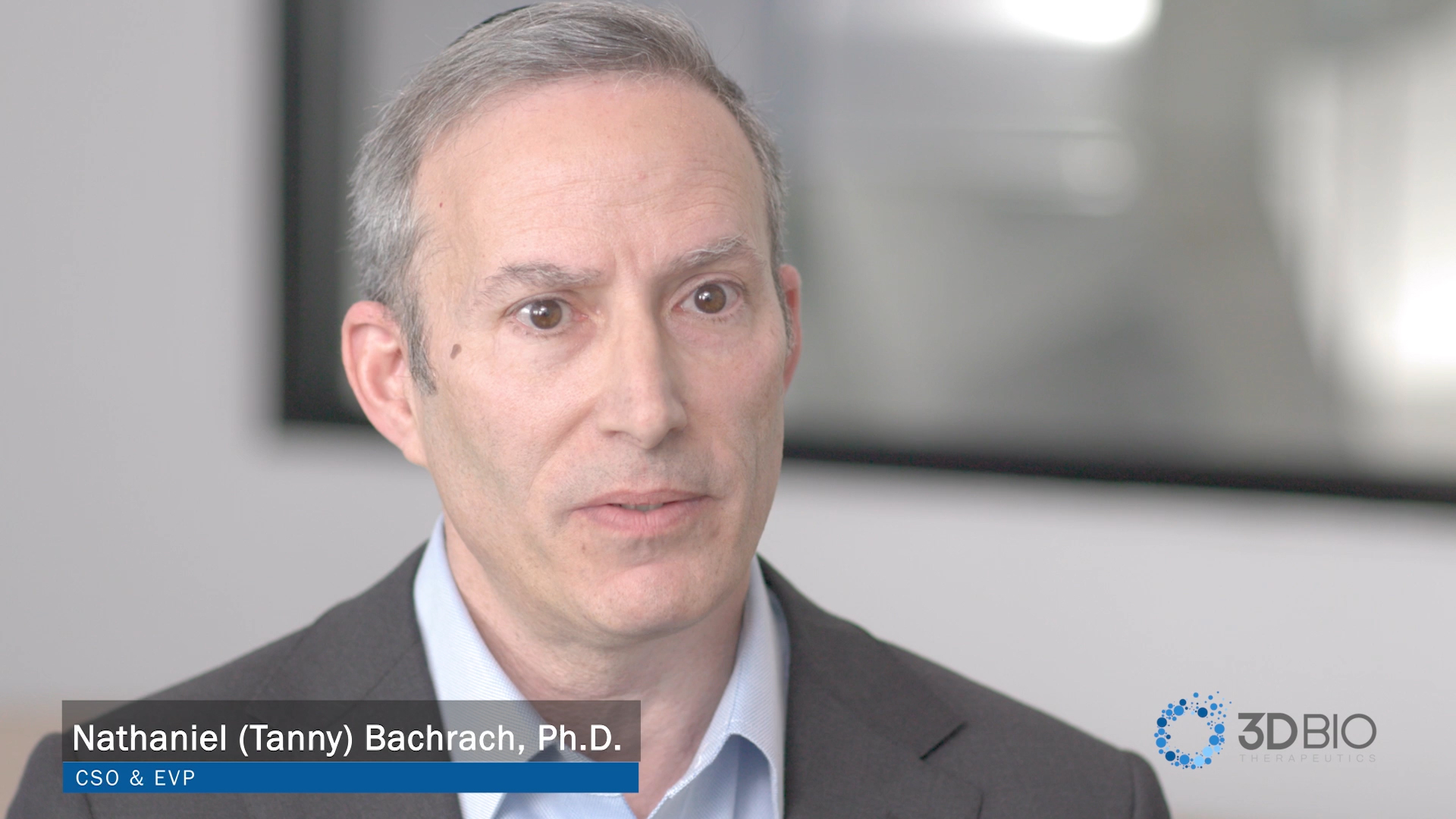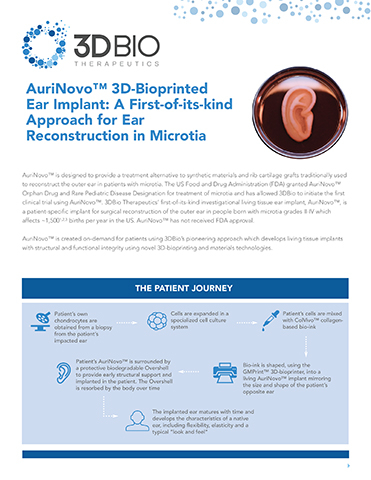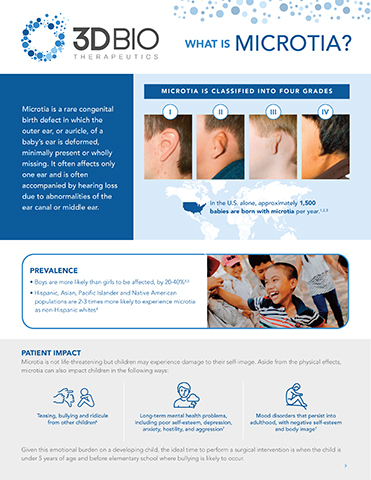NEW YORK & SAN ANTONIO--(BUSINESS WIRE)--3DBio Therapeutics (3DBio), a clinical-stage regenerative medicine company, and the Microtia-Congenital Ear Deformity Institute announced they have conducted a human ear reconstruction using the AuriNovo™ implant, an investigational, patient-matched, 3D-bioprinted living tissue ear implant. The groundbreaking reconstructive procedure in the first-in-human Phase 1/2a clinical trial is evaluating the safety and preliminary efficacy of AuriNovo™ for patients with microtia, a rare congenital deformity where one or both outer ears are absent or underdeveloped. Microtia affects approximately 1,500 babies born in the US annually1,2. This transformational implant procedure was performed by a team led by Arturo Bonilla, M.D., a leading pediatric ear reconstructive surgeon specializing in microtia and the founder and director of the Microtia-Congenital Ear Deformity Institute in San Antonio, Texas.
AuriNovo™ is a patient-specific, living tissue implant created using 3D-bioprinting technology for surgical reconstruction of the outer ear in people born with microtia Grades II-IV. AuriNovo™ is designed to provide a treatment alternative to rib cartilage grafts and synthetic materials traditionally used to reconstruct the outer ear of microtia patients. The U.S. Food and Drug Administration (FDA) has granted AuriNovo™ Orphan Drug and Rare Pediatric Disease Designations.
“As a physician who has treated thousands of children with microtia from across the country and around the world, I am inspired by what this technology may mean for microtia patients and their families,” said Dr. Bonilla. “This study will allow us to investigate the safety and aesthetic properties of this new procedure for ear reconstruction using the patient’s own cartilage cells. My hope is that AuriNovo™ will one day become the standard-of-care replacing the current surgical methods for ear reconstruction requiring the harvesting of rib cartilage or the use of porous polyethylene (PPE) implants. The AuriNovo™ implant requires a less invasive surgical procedure than the use of rib cartilage for reconstruction. We also expect it to result in a more flexible ear than reconstruction with a PPE implant. The AuriNovo™ living tissue implant is designed to provide a better solution for patients born with microtia by transforming their appearance and building their confidence and self-esteem.”
Daniel Cohen, Ph.D., 3DBio Chief Executive Officer and Co-founder, and his team have built a comprehensive, proprietary technology platform to deliver living tissue implants to patients. “This is a truly historic moment for patients with microtia, and more broadly, for the regenerative medicine field as we are beginning to demonstrate the real-world application of next-generation tissue engineering technology. It is the culmination of more than seven years of our company's focused efforts to develop a uniquely differentiated technology platform meeting the FDA’s requirements for therapeutic manufacturing of reconstructive implants,” said Dr. Cohen. “We believe that the microtia clinical trial can provide us not only with robust evidence about the value of this innovative product and the positive impact it can have for microtia patients, but also demonstrate the potential for the technology to provide living tissue implants in other therapeutic areas in the future.”
“Our initial indications focus on cartilage in the reconstructive and orthopedic fields including treating complex nasal defects and spinal degeneration,” continued Dr. Cohen. “We look forward to leveraging our platform to solve other high impact, unmet medical needs like lumpectomy reconstruction and eventually expand to organs.”
In addition to the Microtia-Congenital Ear Deformity Institute, the AuriNovo™ Phase 1/2a clinical trial is enrolling patients at Cedars-Sinai Medical Center in Los Angeles, CA under the direction of John Reinisch, M.D., Director of Craniofacial and Pediatric Plastic Surgery.
AuriNovo™ Clinical Trial
The Phase 1/2a clinical trial is a multicenter, single arm, prospective, open-label, staged study of the AuriNovo™ living tissue ear implant for surgical reconstruction of the external ear in patients born with unilateral microtia. The clinical trial will collect safety data on microtic ear reconstruction using AuriNovo™ and assess preliminary efficacy data which will be measured by overall satisfaction scores from Surgical Outcomes and FACE-Q Kids questionnaires. Following 3D scanning of the opposite ear to specifically match the patient’s ear geometry, AuriNovo™ incorporates the patient’s own auricular cartilage cells into a 3D-bioprinted, living, full-sized ear construct designed to replace the patient’s microtia-affected ear. The trial expects to enroll 11 patients and is being conducted in sites in Los Angeles, California and San Antonio, Texas. For more information on the clinical trial, visit clinicaltrials.gov.
Proprietary 3D-Bioprinting Technology
3DBio has developed unique capabilities enabling the creation of living tissue implants for therapeutic applications. The Company not only created the first 3D-bioprinted living tissue implant, but it also created an entire suite of processes and engineering solutions required to support the technology platform. The platform is purpose-built to meet the FDA’s requirements for therapeutic manufacturing and includes: proprietary cell processes to rapidly expand cells in sufficient quantity; ColVivo™ therapeutic grade bio-ink to preserve key biological and rheological properties; GMPrint™ 3D-bioprinter to enable a sterile workflow combined with exceptional quality and speed; and Overshell technology to add non-permanent structural support to biological implants.
About AuriNovo™
AuriNovo™ is a patient-specific, supportive living tissue implant created using 3D-bioprinting technology for surgical reconstruction of the external ear (auricle) in people born with microtia Grades II-IV. The construct is a 3D-bioprinted collagen hydrogel scaffold encapsulating the patient's own auricular cartilage cells (chondrocytes). The construct is printed in a size and shape matching the patient’s opposite ear for implantation. AuriNovo™ was granted Orphan Drug and Rare Pediatric Disease Designations by the FDA for reconstruction of the outer ear in patients with microtia.
About the Microtia-Congenital Ear Deformity Institute
Founded in 1996 by Dr. Arturo Bonilla, the Microtia-Congenital Ear Deformity Institute helps children born with microtia and other ear deformities. It is one of the largest clinics in the world specializing in pediatric microtia reconstruction surgeries and has performed thousands of procedures to help children born with this ear deformity. The Microtia-Congenital Ear Deformity Institute is based in San Antonio, Texas. For more information visit: https://www.microtia.net/.
About 3DBio Therapeutics
3DBio Therapeutics (3DBio) is a clinical-stage regenerative medicine company solving medical challenges by pioneering custom-engineered, patient-specific, 3D-bioprinted, living tissue implants. 3DBio’s groundbreaking approach develops living tissue implants with structural and functional integrity using a full suite of features to meet the FDA’s requirements for therapeutic manufacturing including novel and proprietary 3D-bioprinter (GMPrint™), bio-ink (ColVivo™), specialized cell culture system, and implantable protective Overshell technology. 3DBio’s first investigational product, AuriNovo™, is currently being evaluated in a Phase 1/2a clinical trial for ear reconstruction in patients with microtia and has been granted Orphan Drug and Rare Pediatric Disease designation by the FDA. For more information visit: www.3dbiocorp.com
REFERENCES:
1 Luquetti, D.V., et al., Microtia: epidemiology and genetics. American Journal of Medical Genetics Part A, 2012. 158(1): p. 124-139.
2 Luquetti, D.V., E. Leoncini, and P. Mastroiacovo, Microtia-anotia: a global review of prevalence rates. Birth Defects Res A Clin Mol Teratol, 2011. 91(9): p. 813-22.
Certain information set forth in this press release may constitute “forward-looking statements” under applicable securities laws. There are a number of factors that could cause actual results or outcomes to differ materially from those addressed in such forward-looking statements. Thus, forward-looking statements are provided only as an opportunity to understand management’s beliefs and opinions in respect to the company’s future prospects.
For additional resources (photos, b-roll, video statements, biographies, headshots, etc.) and access to the media room, please email 3dbio@lavoiehealthscience.com.

